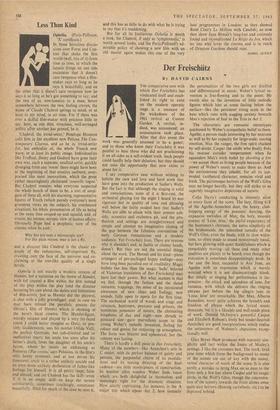Der Freischiitz
By DAVID CAIRNS THE comparative ease with which Der Freischiitz has vindicated itself and estab- lished its right to exist on the modern operatic stage is a measure of the wickedness of the 1961 revival at Covent Garden. A revival, in- deed, was announced; an assassination took place.
1111111111• After that dire event the work was generally assumed to be a goner; and to those who knew their Freischiitz it was painful to hear those who did not proclaiming it on all sides as a self-evident truth. Such people could hardly help their delusion; but they should not miss the opportunity that now exists to atone for it.
I say comparative ease without wishing to belittle the care and love and hard work that have gone into the production at Sadler's Wells. But the fact is that although the singing is solid and conscientious, none of it is first-rate, the orchestral playing (on the night I heard it) was vigorous but in quality of tone and phrasing well below the fairly modest best that Sadler's Wells are able to attain with their present sub- sidy, acoustics and orchestra pit, and the pro- Auction and settings are straightforward and simple and attempt no imaginative closing of the gap between the fabulous conventions of early German romanticism and a modern audience. Yet Freischiitz lives. There are reasons why it shouldn't and, in feeble or clumsy hands, doesn't. But they are not the essential things about the work. The Hermit and his kind—pious arrangers pf pre-packaged happy endings—may have long been parodied out of credibility. Magic bullets (no less than the magic 'balls' beloved of Victorian translators of Der Freischiitz) may have lost their power. But what matters is that we feel, through the fustian and the dated romantic trappings, the sense of an intoxicated awareness of new ideas and feelings, new sounds, fully open to opera for the first time. The enchanted world of woods and crags and cataracts, huntsmen, peasants and princes, the numinous presences of nature, the alternating kingdoms of day and night—now shrunk to postcard size—gave marvellous scope to the young Weber's melodic invention, feeling for colour and genius for conjuring up atmosphere. The form was bizarre and ephemeral, but the content was lasting.
There is hardly a dull piece in Der Freischiitz. Many of the numbers--like Aennchen's aria in C major, with its perfect balance of gaiety and passion, the purposeful charm of its modula- tions and its teasing delaying of the final cadence—are little masterpieces of construction. In number after number Weber finds tunes which are both delightful in themselves and unerringly right for the dramatic situation. How utterly captivating, for instance, is the A major trio which opens Act 2, how instantly the personalities of the two girls are diitilled and differentiated in music. Weber's lyrical in- vention is free-flowing and to the point. He excels also in the invention of little melodic figures which hint at some feeling below the surface—like the persistent rising scale in the bass which runs with nagging anxiety beneath Max's rejection of fear in the Trio in Act 2.
The characters are romantic stereotypes quickened by Weber's sympathetic belief in them. Agathe, a person made interesting by her neurosis as well as by her capacity for large-scale, soaring emotion, Max the ranger, the free spirit chained by self-doubt, Caspar the misfit who finally fixes his morose outsider temperament when he squanders Max's sixth bullet by shooting a fox —we accept them as living people because of the power of Weber's music to make them so. And the environment they inhabit, for all its out- moded, cardboard character, remains vivid and fresh. The picturesque horrors of the Wolf's Glen may no longer horrify, but they still strike us as superbly imaginative depictions of nature.
Colin Davis's conducting is intensely alive to every facet of the score. The lazy, lilting 6/8 of the Agathe-Aennchen duet, the heavy, clod- hopping energy of the peasants' dancing, the expansive melodies of Max, the holy, moonlit ecstasy of `Leise, leise,' the joyful expectancy of the huntsmen's choruses, the naïve simplicity of the bridesmaids, the unleashed tumults of the Wolf's Glen, even the finale, with its slow waltz- tune, so often made to sound monstrously banal, but here glOwing with quiet thankfulness which is remarkably moving—all these and many other qualities are plainly to be heard, even though the execution is sometimes disappointingly weak. In the cast the least successful is Ava June, an Agathe with an expression which is merely worried when it is not disconcertingly blank. But simply as singing her performance is im- pressive: the attack and splendour of tone, for instance, with which she delivers the ringing phrases just before the big allegro tune in `Leise, leise' are remarkable. Her Max, Alberto Remedios, never quite achieves the breadth and freedom of phrase which the lyrical music demands; but it is a likeable and well-made piece of work. Donald McIntyre's powerful Caspar and Elizabeth Robson's lively but tender-hearted Aennchen are good interpretations which realise the seriousness of Webster's characters excep- tionally well.
Glen Bryan Shaw produces with masterly sim- plicity and tact within the limits of Motley's settings. I like the costumes best. The stark, livid pine trees which form the background to many of the scenes are out of key with the sunny, vernal character of much of the score. It is' also surely a mistake to bring Max on so near to the front only a few feet above Caspar and his magic circle, in the Wolf's Glen, though the concentra- tion of the scenery towards the front allows some quite nice hdrrors (flaming cartwheels, etc.) to be deployed behind.


































 Previous page
Previous page